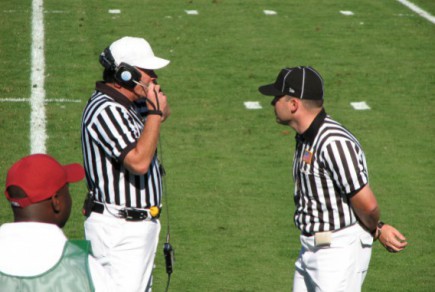Dear Coach Saban,
Thanks to you and your friends, the NCAA, recently announced they would be considering a rules change to prevent offensive units from snapping the ball during the first 10 seconds of the 40-second play clock, thus allowing defensive units to make substitutions during that time and ostensibly promote the safety of the players. It comes up for a vote with the oversight committee on March 6, and what Ducks’ fan can sit idly by while some coaches with over-sized egos and outdated strategies exploit their influence in order to crush an exciting innovation in the sport? Not this one.
Coach Saban, you’re a great football coach and a gifted teacher and your trophy collection proves it, but the game is changing and your methods are becoming obsolete. As much as I respect you and the other “old school” coaches, going to the NCAA and asking them to change the rules to keep players safe from something for which there is no evidence — all so you can stay relevant — is nothing short of cowardly. There is no country for old men, Nick. Your choice is to adapt to change or become its victim.
Imagine if this discussion had happened when the forward pass was introduced. Would you and your friends have appealed to the NCAA to prevent other teams from using it because it required players to keep their chins up in the air and made them vulnerable to getting hit?
To those of you who think the hurry-up/no-huddle offense is a way to cheat, it’s not cheating any more than was throwing the ball over the line of scrimmage. It’s simply making new and different choices within the same set of rules which have governed the sport for many years. To those who think it creates a dangerous situation for players, show us your evidence. Good luck with that, because there is no such proof.

Ironically, under the new rule officials will be forced to call a “Delay of Game” penalty for snapping the ball too soon.
If anyone is “cheating,” it is those trying to make a rules change in an off-year under the guise of player safety because they don’t want to adapt to the new reality.
Case in point: if it was truly a danger to players, why is it only being discussed as it applies to the 40-second play clock? If the players are in such deadly peril from the offense snapping the ball in the first 10 seconds after the whistle blows, why is it okay to further endanger them during the final two minutes of each half when the play clock is shorter?
Nick, the hurry up/no-huddle is not a gimmick, it’s a proven strategy. For decades, military fighter pilots have referred to something they call the “OODA loop,” which stands for Observe, Orient, Decide, Act. It’s a repeating psychological process everyone follows in any given competitive situation – in that order – whether they realize it or not.
It was originally developed over many years by the late John Boyd, US Air Force colonel and military strategist, to help US fighter pilots during aerial dogfights. In a nutshell, the idea is that in the heat of combat, the guy who makes the “good” decision the fastest, beats the guy who took additional time to make the “best” decision.
“Getting inside the opponent’s OODA loop” has become a successful strategy in combat, business and most recently in college football. If you can beat the other guy to the “Act” stage, and your action is basically sound and functional, you put your opponent on his heels where he is forced into re-observing and re-orienting. By the time he makes his decision, it’s based on old information because you’re already halfway through your next loop. Rinse and repeat that process, and the Oregon Ducks just put up five touchdowns on you by the time you think about looking at the scoreboard.
It’s possible to defeat the hurry-up/no-huddle without changing the rules, otherwise the Oregon Ducks would have been national champions three years ago. It’s time to man up and adapt to the new reality. Set an example for the students you’re mentoring, don’t hide behind them while you pull strings, call in favors and meddle with the rules from the shadows.
Top photo by Amber Sutton and AL.com
Related Articles:
Chip Kelly Update: Everything's Good Again ...
Chip Kelly Update: Wailing and Gnashing of Teeth
Shock and Awe -- The Oregon Ducks' Football Hangover Effect
Despite Lopsided Score, Georgia State "Never Stopped Believing"
Hope Springs Eternal for Ducks
Incompetent Pac-12 Officials: How Do You Miss ALL of THIS?
Charles Glenn obtained his Bachelor of Arts degree while serving in the US Navy as a journalist for nine years. He was trained in print journalism, photojournalism and public affairs at the Defense Information School at Ft. Benjamin Harrison, IN, in 1993-94, and went on to serve in both print and broadcast assignments in Keflavik, Iceland, two Western Pacific deployments aboard on the the USS Tarawa (LHA-1), and as a writer/editor for the base newspaper at Naval Air Station Everett, WA. He continued working as a civilian US Army public affairs editor, photographer, and writer until 2008, and now currently works for Standard Insurance in Portland, OR. Born in Amarillo, TX, where he played on the offensive line for his high school football team, Charles has been an avid Duck fan since before moving to Oregon in 1988. He is 44, married, and is raising four children.
